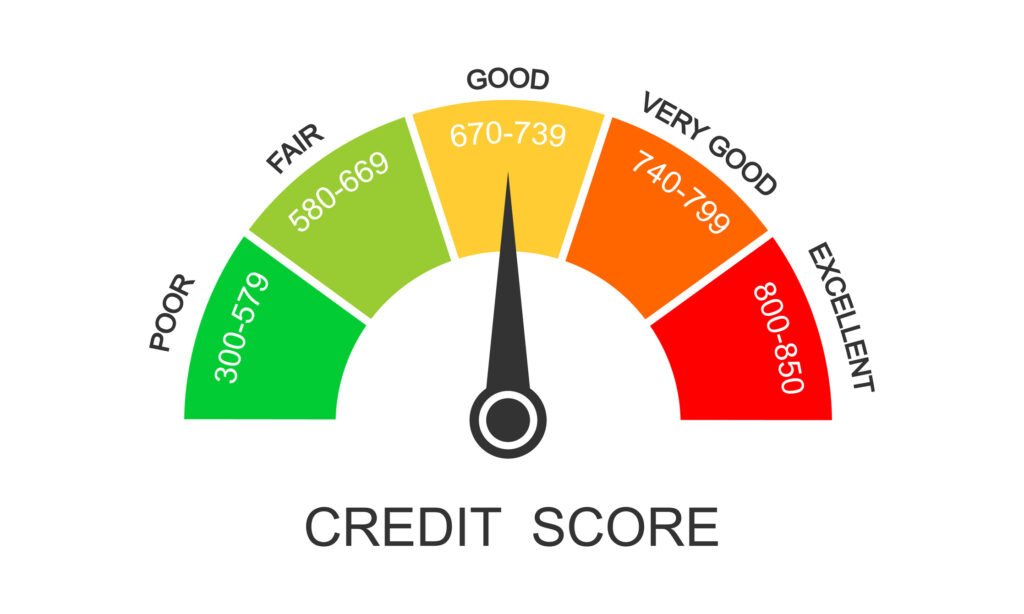Your credit score influences nearly every aspect of your financial life—from getting a loan or mortgage to qualifying for certain types of insurance or bonds. Understanding where your score falls on the credit score chart and how to improve it can make a major difference in your borrowing power and long-term financial health.
What Are the Credit Score Levels or Ranges?

Credit scores typically range from 300 to 850, and are grouped into five main credit score levels or credit score categories that reflect your creditworthiness. These are based on FICO scoring models used by lenders and insurers across the U.S.
| Range | Category | What It Means |
| 300–579 | Poor | Borrowers often struggle to qualify for credit or loans and face high interest rates. Missed payments, high utilization, or accounts in collections usually contribute to this rating. |
| 580–669 | Fair | Considered “subprime.” You can qualify for credit but at higher rates. Building positive history and lowering debt can help reach higher credit score tiers. |
| 670–739 | Good | Indicates a reliable borrower. Most lenders view this range as acceptable and may offer competitive interest rates. |
| 740–799 | Very Good | Seen as low-risk. Borrowers enjoy broader access to loans and credit cards with favorable terms. |
| 800–850 | Excellent | The top credit score rankings, signaling exceptional financial responsibility and qualifying for the best rates and rewards. |
How Are Credit Scores Calculated?
Credit scoring models consider several weighted factors to determine where you fall within the credit score range chart:
- Payment History (35%) – Whether you pay bills on time; even one 30-day late payment can lower your score.
- Amounts Owed (30%) – How much of your available credit you’re using (your utilization ratio).
- Length of Credit History (15%) – Older accounts help show consistent borrowing behavior.
- New Credit (10%) – Recent hard inquiries or new accounts can cause small, temporary dips.
- Credit Mix (10%) – A blend of credit cards, loans, and installment accounts improves your profile.
In 2025, the national average FICO score hovers near 715, meaning most Americans are in the “good” range.
What Is a Good or Bad Credit Score?

A “good” score typically begins around 670 and up, while scores below 580 are generally viewed as risky by lenders and insurers. The higher your score, the lower your borrowing costs—and in many states, your insurance premiums.
Good credit affects far more than loan approvals. Many landlords, utility providers, and even some employers review your credit score ratings when evaluating applications. For contractors and small business owners, strong personal credit can also improve access to contract bonds and financing.
How Can I Improve My Credit Score?
Raising your score takes time and consistency, but small habits lead to steady gains. Here are key strategies proven to boost your credit score levels:
Pay on Time, Every Time
Payment history is the single biggest factor. Set up autopay or reminders to avoid missed due dates.
Lower Credit Card Balances
Reduce your utilization ratio by keeping balances well below your limits—ideally under 30%, though less is better.
Keep Older Accounts Open
Longer credit history builds stability. Avoid closing long-standing cards unless necessary.
Limit New Applications
Each new hard inquiry can cause a temporary dip, so apply only when needed.
Monitor and Dispute Errors
You’re entitled to free weekly reports from Equifax, Experian, and TransUnion. Correcting inaccuracies can raise your score quickly.
Quick Benefits of Higher Credit Scores
Having higher credit score tiers delivers tangible advantages:
- Lower interest and premium rates: Lenders and insurers reward low-risk borrowers with better pricing.
- Higher bond and credit capacity: Contractors and business owners with strong FICO scores can access greater surety and lending limits.
- Faster approvals: Good credit smooths the path for mortgages, car loans, and leases.
Where to Check Your Credit Score
Many credit-card issuers and banks now offer free credit score rankings updates to customers. You can also check directly through Experian, Equifax, or TransUnion for detailed reports and monitoring tools.
Credit Scores in 2025: Day-to-Day Impact
Credit still shapes daily life in 2025. Lenders, insurers, landlords, and some employers continue using credit score ratings to gauge reliability and risk. Knowing how your score is used—and how to protect it—can save money and reduce friction when you apply for financing, insurance, or housing.
Where your score matters most:
- Loans and cards: Higher scores unlock better rates and credit limits.
- Insurance pricing: Many states allow credit-based insurance scoring for auto and home policies.
- Housing: Strong credit helps renters and homeowners secure favorable terms.
- Employment: Certain finance or security roles may include credit checks (with consent).
- Utilities and phones: Good credit often eliminates deposits for new accounts.
Take Control of Your Credit Future
Understanding the tiers of credit scores empowers you to take charge of your finances. Whether you’re improving from “fair” to “good” or maintaining an “excellent” rating, steady financial habits—like paying on time, keeping balances low, and monitoring reports—can make a lasting impact.
Your credit is more than a number; it’s a key to financial flexibility, lower costs, and expanded opportunity.





